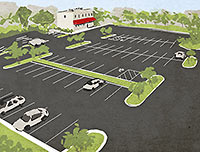COMMENT OF THE DAY RUNNER-UP: ZONING WOULDN’T HAVE KEPT THE SPRAWL AWAY  “It’s always frustrating when I hear Houston’s sprawl and prevalence of strip malls blamed on our lack of zoning. You can blame these on the setbacks and parking minimums that came along with Chapter 42, which made it illegal to build walkable neighborhoods.” [Angostura, commenting on Comment of the Day: The Kind of Zoning Houston Does Have] Illustration: Lulu
“It’s always frustrating when I hear Houston’s sprawl and prevalence of strip malls blamed on our lack of zoning. You can blame these on the setbacks and parking minimums that came along with Chapter 42, which made it illegal to build walkable neighborhoods.” [Angostura, commenting on Comment of the Day: The Kind of Zoning Houston Does Have] Illustration: Lulu





It should be illegal to have walkable neighborhoods. Don’t you commies know the weather is too hot here? You go outside, you die – its science. You may be thinking, “Notcommonsense, with the set back requirement and large parking lots in suburban developments, don’t people have to walk outside large distances from their parking spot to the building?” And I will reply, “not if you drive an H2 Hummer, and you make parking spots where ever you please, you commie liberal hippy”
Totally. When you’re forced to build with massive use of automobile in mind, without option to build with walkablity in mind, what you get is a continuation of the car-need-cycle.
Sigh…nearly every discussion of sprawl vs walkability ignores this incredibly obvious point: affordability, space, walkability, you may pick TWO. Sprawl, for its social costs, allows the middle class to live in something other than a shoebox apartment or townhome. Why should owning a freestanding home with a yard be reserved for the wealthy?
I appreciate walkable neighborhoods, and hope to be able to afford to live in one someday, but to argue that they are a panacea that are the answer for everyone and every part of Houston is to bury one’s head in the sand.
As much as the “middle class” has suffered this last decade(s), that yard and two story house cost a lot of money in infrastructure to support. Spread out infrastructure is costly to maintain if you want keep being in a modern, global economy. America still has great logistical networks, but we got a lot of infrastructure that needs to be brought up to the 21st century.
While many bemoan the high upfront costs of mass transit from a local to regional to state to federal level, our policies in Houston have certainly masked the cost of sprawl up until somewhat recently. I10 certainly opened our eyes; we got 290 ongoing, going to need to do 288, can’t forget I45 and are you ready for the eventually 59S upgrade from BW8 to downtown? Not to mention the condition of our roads from wear, tear, and epic drought. I shan’t tell you about our metro’s aging water infrastructure compounded by rapid growth.
Houston talks a big game about the free market and “city building”, but it’s going to be in sticker shock when you’re paying gas, on top of a $10 toll fee, on top of vehicle registration, and on top of car maintenance for the average 35 mile round trip commuter if it doesn’t get serious about planning it’s future.
@Grant: You can have affordable housing in walkable neighborhoods, you just have to build more of it with fewer rules which prohibit its construction and make said construction more expensive. Cities like NYC and SF are expensive not because they’re dense, but because of NIMBYism and too-strict zoning provisions preventing new construction. Also, people need to get over the obsession with giant freestanding homes. Average home size in the US has ballooned from ~1000sf around WW2 to ~2400sf today–and this is NOT a good thing. It’s not hard to pack your typical 3 bed, 2 bath, living, dining, kitchen setup into an 1100sf townhome, if you’re willing to let the rooms be smaller. And what are you doing with that 24×16 living room anyway? A lot more vacuuming, dusting, cooling, and heating, that’s what…
You must have not read my post. I didn’t say that you couldn’t have affordable dense neighborhoods. Although I should have added that affordable dense neighborhoods in thriving cities rarely exist without affordable housing laws or subsidies. Given the choice, developers in dense markets with high land prices will always choose to build luxury housing over affordable housing. It’s not just NIMBYism, it’s basic economics.
“People need to get over the obsession with giant freestanding homes” – if you don’t want a large, freestanding home, then don’t buy one! Those who buy a freestanding home in the suburbs are choosing space (and additional heating/cooling/dusting/driving) over what you might call convenience. At least Houston offers you the choice. In many parts of the world (such as the Netherlands, where I used to live), you would have to be a millionaire to approximate even a middle-class suburban Houston standard of living. I had about 1000 sq ft there, which was indeed adequate, but after a day of working my heiny off I’d much rather come home to something better than “adequate”.
“Spread out infrastructure is costly to maintain if you want keep being in a modern, global economy.” High density is costly to maintain, too! Building a new highway tunnel or subway line through a densely-packed city is astronomically expensive. Doing a complete renovation on a canal house in Amsterdam, where’s there’s no space for staging equipment, etc, is an expensive logistical nightmare compared with remodeling a freestanding house in Houston. Etc etc.